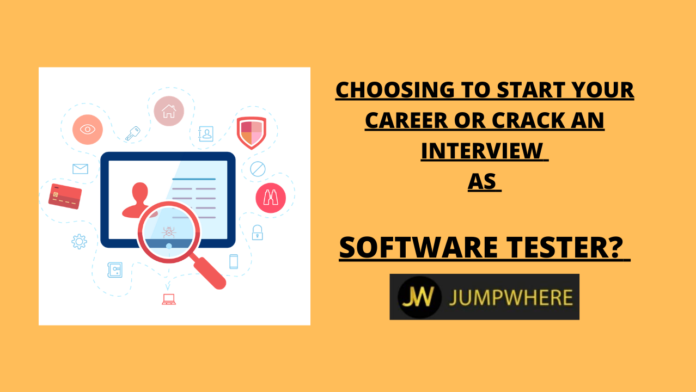Planning to start your career as a Manual Software Tester or upgrade yourself to Automation Software Tester or even planning to switch jobs with less than 2 years of experience? The article highlights the roles and responsibilities of a tester, the tools one needs to know and how do you improve your skillset.
Software Testing is a process to check whether the software behaves or matches the expected requirements or not. It enhances your business understanding and ability to think differently.
As a Software Tester, your job would be to certify that the software works as per the given requirements and has no defects by identifying errors and missing requirements w.r.t the given requirements. It involves verification and validation of the software components using manual or automated tools.
If you are really looking to start your career as a software tester you should first clear aptitude round (verbal-ability, quantitative, reasoning) and have knowledge on testing-concepts and its various tools (any open source). There are different testing profiles, as a beginner, we can choose to be a manual tester.
Manual Software Tester Roles and responsibilities:
Any fresher when hired will be labeled as a Software Test Engineer or Quality Analyst or Software Tester or Application Tester or (this may vary as per company), your job would be to test the software. Below are key responsibilities a tester should perform.
Also read: Latest IT Job Openings
- Analyze the requirement and come up with queries or any gaps. Queries would be a set of valid questions communicated either in email or in-person. This will help to have a better and improvised understanding of the requirements.
- Once the queries are addressed, list out all the possible positive and negative Scenarios.
- Convert the above scenarios to test-cases (TC).
- Able to conduct Test-Case review i.e. the process of verifying TC’s have covered all positive and negative scenarios of the requirements or not.
- Once the software is ready, test the software alongside the TC you prepared above
- If software’s behavior and requirement do not match, we track it as a defect via defect tracking tools.
- The defect has its life cycle to be completed. Once all the defects are addressed and closed, we are good at sign-off the product.
- It is good to be aware of other workflows like Test-plan and Test-strategy.
- Seniors/Managers would take care of these documents, but it is recommended to learn the purpose and what are the key points included in such documents.
Skills required for a Manual Software Tester:
- Able to adapt to Agile-methodology and Scrum-testing-methodology. These are the process to which the company adheres to deliver the software.
- Be prepared to complete the software testing life cycle (STLC) which includes:
- testing concepts
- testing principles
- different types of testing
- testing methodologies
- testing techniques
- full bug life cycle etc. (concepts).
- A hands-on demo project would be an added advantage.
- While testing, data stored in backend databases like Oracle, MySQL, etc would be required either to validate or test some functionalities.
- Basic knowledge of SQL, mainly the concept of ‘joins’ using ‘select’ queries is required for a tester.
- Communication and Written skills play an important role. As a tester you would need to:
- Interact with the developer to explain bugs and issues.
- Communicate with the BA to understand the functionalities.
- Interact with the manager to provide Testing reports and status.
- Prepare documentation related to the project.
- Log the defects with crisp and clear information
Tools a Manual Software Tester must be aware of:
Every process/activity is tracked in some tools. Depending on the companies’ the tools may vary but the purpose remains the same. Few tools help maintain a complete testing life cycle (STLC), however, few are meant for a few specific activities only.
Below are a few software testing tools that you can explore:
- HP-ALM(QC) – make use of free trails. It helps for planning and managing project and its artifacts, and for tracking defects throughout the testing lifecycle process.
- Bugzilla, Mantis – Defect tracking tools that the entire team would need to maintain and track the defects and their life cycle.
- MS Excel to write test case as a beginner else it can be directly written in the tools like TFS, Test link, etc.
- MTM(not an open-source tool) to maintain the TC’s and execute the TC’s and maintain its results sprint wise.
- SQL clients to connect to the database. Use online SQL-editors for practicing.
- API is an intermediate layer that connects UI and DB. Explore API testing using Postman, Soap-UI, etc
- The Lambda-test tool supports a wide range of OS, resolution, browser that helps cover compatibility/ cross-browser testing.
ALSO READ: Tips to Crack Salesforce Job Interview
What’s the next step for a Software Tester?
Now, you are ready to upgrade from Manual Testing to Automation Testing or perform both based on the requirements. Automation testing is to automate the stable software for repetitive iterations and regression testing.
Automation Software Tester Roles and responsibilities:
- Able to build an automation framework or can make use of the readymade framework.
- Perform a feasibility check if the modules or features can be automated or not.
- Able to write, design, and execute automated tests using scripts.
- Choose the TC’s to be automated based on the priority for test scenarios.
- Write documentation for automated processes including test plans, test procedures, and test cases.
- Keep a track of the bugs in the system.
Skills required for an Automation Software Tester:
- The first skill is Knowledge on any one of the languages Java, c#, Python, PHP, etc
- Understanding on required tools to automate as mentioned in the below tools section.
Also Read: Tips to Crack Java Job Interview
Tools for an Automation Software Tester:
As an automation tester, you will be majorly coding and working with various tools. We have mentioned a few famous tools widely used by Automation testers in the industry:
- IDEs for writing code (VSCode, Visual-Studio)
- Automation testing tools: Selenium (open source), TestComplete or Katalon
Studio(open source), - For mobile testing and API testing, one must have knowledge about automation tools such as Appium, Soap client, Swagger UI, Postman, etc.
Also read: Blogs for IT Employee
Additional tips to increase chances of shortlisting your RESUME and get more job opportunities:
- An effective resume that includes project experience on testing, your achievements,
learnings etc. - Experience in Demo projects (for freshers) or freelancing jobs. Refer the link utest for
hands-on live projects. - Certification on ISTQB foundation level(not mandatory but may help identify your
skills). - Lastly, enhance your soft skills and present yourself in a professional way.
Good luck!






